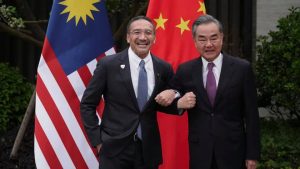Earlier this month, Malaysian social media went haywire when Malaysian Foreign Minister Hishammuddin Hussein called China a “big brother” in front of his Chinese counterpart, Wang Yi. This was done in a live televised press conference on April 2 in Beijing, where Malaysia’s top diplomat was attending a bilateral Malaysia-China dialogue. In the 47 years that China and Malaysia have maintained diplomatic ties, Malaysia has been extremely careful to assert its independence and sovereignty in its relationship with Beijing. Hence the term “big brother” was widely seen as Malaysia kowtowing to China and confirming China’s preeminent status in the wider Southeast Asian region.
After the massive blowback in cyberspace, Hishammuddin was forced to take to Twitter to issue a statement that he was merely showing respect to his counterpart, a senior Chinese statesman. He was implying that he was merely practicing “Asian values,” which is to say, respect for elders. The comment was intended to convey that Wang was “a more senior Foreign Minister, hence ‘elder brother’ to me personally,” Hishamuddin tweeted on April 3. “Being respectful does not signify weakness.”
There are several reasons why this comment was so sensitive in the Malaysian context.
First, there is a sizeable ethnic Chinese minority in Malaysia, which makes up just over 25 percent of the population. A significant segment of the Malay elite has always questioned the loyalty of the Malaysian Chinese and Malaysia’s long-standing Malay-first policy has further added to the Malay-Chinese tensions. Since before the country’s independence, the Malay elite has harbored suspicions that the ethnic Chinese may ultimately be more loyal to Beijing, despite most having settled in Malaysia generations ago. For years the Malaysian government used the narrative that communism in Malaysia was largely a Malaysian Chinese problem. Communism was painted as a “sin” among the Malay Muslim population, given that communism is atheist. In a context in which Malaysian Chinese are systematically marginalized in the political system in the name of Malay supremacy, calling China a “big brother” is never a good idea.
Second, in the context of China’s rising power and its government’s refusal to discuss its expansive “nine-dash line” maritime claim, Malaysians are extremely sensitive to anything that sounds like Malaysia is bending toward China. Malaysia and China are both in dispute over several islands in the South China Sea and Chinese naval vessels and fishing boats regularly enter Malaysian waters that Beijing claims fall within its “nine-dash line.” Reports say that the Chinese navy entered Malaysian waters at least 89 times between 2016 to 2019, and often refused to leave the area even after being warned away by the Malaysian navy. More than 100 Chinese fishing vessels have done the same.
The U.S. government has repeatedly asked Malaysia to confront China over its regular incursions by its navy and fishing vessels, but Malaysia has chosen a softer, more diplomatic approach.
Third, many Malaysians are concerned that the increasing Chinese investments in Malaysia will lead to domination by China in the years to come. Some of the Chinese investments are in key, strategic areas. Some of these are especially sensitive, such as the project to build a new island in the Johor Strait close to Singapore to attract more Chinese nationals to live in Malaysia.
Thus Malaysia, at least on the formal level, has always maintained that it is neutral when it comes to the “big powers,” i.e. the United States and China.
And so was Hishamuddin’s comment a Freudian slip or a faux pas? I would argue that it was the former. Ever since the administration of Prime Minister Najib Razak, Malaysia has increasingly turned toward China for trade and investment, and in some areas, diplomatic support. It is an enthusiastic supporter of the Belt and Road Initiative and will take part in the high-speed rail project that eventually aims to link Singapore to Kunming in southwest China. Many of the largest planned infrastructure projects in Malaysia are linked to China.
The two-way trade value between Malaysia and China reached $76 billion in 2019, and constituted 17.2 per cent of Malaysia’s trade. China has been Malaysia’s largest trading partner for 11 consecutive years.
Malaysia was also an early member of the ASEAN-initiated (but China-dominated) Regional Comprehensive Economic Partnership trade agreement. In recent days, moreover, Malaysia has announced that it will be using a Chinese-made COVID-19 vaccine.
The Malaysian FM probably became very close to the Chinese leadership during his stint as Minister of Transport during the disappearance of Malaysian Airlines Flight MH370, many of the victims of which were Chinese nationals. (The flight had been bound for Beijing.) He was Malaysia’s point man for the issue, led the press conferences, and liaised with the Chinese government to coordinate the search for the doomed aircraft.
He is also known for taking a “softly softly” approach to China, knowing that a direct confrontation with China is not possible. When the Sarawak chief minister complained to him recently about Chinese fishing vessels entering Sarawak waters at will, he arranged a “tea session” between the chief minister and the Chinese Ambassador to Malaysia rather than confronting the envoy directly.
In conclusion, while in public Malaysia maintains a neutral stand in regard to the competition between the U.S. and China, in private, under this foreign minister, Malaysia has tilted significantly toward China. Western powers such as the U.S. and Australia are aware of this but do not want to make it public. They are hoping that Malaysia will turn back to the West once they realize that the “softly softly” approach to China has not yielded much in the way of results.

































